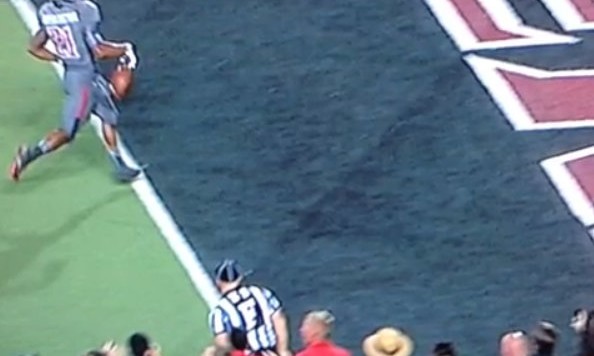Monday, we looked at the inconsistency built into college football’s rules on the matter of run-based possession versus pass-based possession in the end zone. Today’s topic is the inconsistency built into college football’s rules on the matter of fumbles. Some fumbles are treated differently from others, for no truly good reason. This is something which also flows from colleague Bart Doan’s treatment of the five worst rules in college football, published last week at The Student Section.
Do check out Bart’s article if you missed it. You’ll notice that the cover photo for that piece shows a player losing control of the ball just before getting to the pylon (which was obscured in the photo by the figure of the official, who was appropriately looking across the goal line). The play was properly ruled a touchback, and it caused Tennessee to lose to Georgia in overtime last season.
Remember, here, that we’re not focusing on bad calls. This week’s set of pieces deals with rules that are properly enforced by officials… but are not consistent across various situations. Maybe you think that fumbling the ball near the end zone — with the ball hitting the pylon or going out of the end zone — is a good rule. There’s nothing wrong with that. It’s a free country, and we all have different opinions on what should and shouldn’t be rewarded (or punished). All’s fair in love, war, and college football rules questions.
However…
If you do think that carelessness or indadequate ball security near the end zone should be punished with a touchback (or at the very least, the loss of possession; some would say that the defense should get the ball at its own 1 instead of the 20), you should be consistent. You should then think that if a player is foolish enough to celebrate a touchdown before getting to the goal line, such that he drops the ball at the 1 instead of when he’s several yards deep into the end zone, the defense should gain the benefit of a touchback in that situation as well.
If anything, the act of intentionally dropping the ball in celebration before getting to the goal line should be severely punished before an unintentional fumble near the pylon. If we’re evaluating certain kinds of fumbles as a measure of carelessness or appallingly bad fundamentals, the intentional ball drop should trump what Bart Doan referred to as honest effort, which was demonstrated by the Tennessee ballcarrier against Georgia. If Tennessee should have gotten whacked with a severely punitive touchback against Georgia, then Texas Tech should have been hit with the same penalty in its Thursday night game against TCU from Sept. 12, 2013.
*
You can simply see the cover photo for this story, courtesy of Gamedayr.com. You can see the ball tumbling out of the hand of Texas Tech’s DeAndre Washington before he gets to the goal line.
Here is the YouTube video of the play, found at 2:09:15:
You could point out that TCU did not immediately pounce on the fumble and accordingly say that the lack of an immediate recovery did not help the Horned Frogs’ cause in this situation. However, that point is minimized, even wiped out, by two counterpoints:
1) This article by Dennis Dodd of CBS Sports, which includes an interview with Big 12 officiating supervisor Walt Anderson, indicates that the blowing of the whistle for a touchdown would have prevented TCU from gaining possession of the ball, anyway.
2) A fumble off the pylon or out of the end zone is itself a fumble that is never recovered by the defense to begin with. In that most important sense, it is no different from the Texas Tech fumble at the TCU 1.
As Bart Doan simply and accurately showed, the Tennessee runner was trying hard to make a play.
The Texas Tech ballcarrier acted like a fool.
Tennessee got punished with a loss of possession for its fumble near the goal line. Texas Tech did not.
What kind of rule structure allows that to happen?
College football’s rule structure, that’s what.

